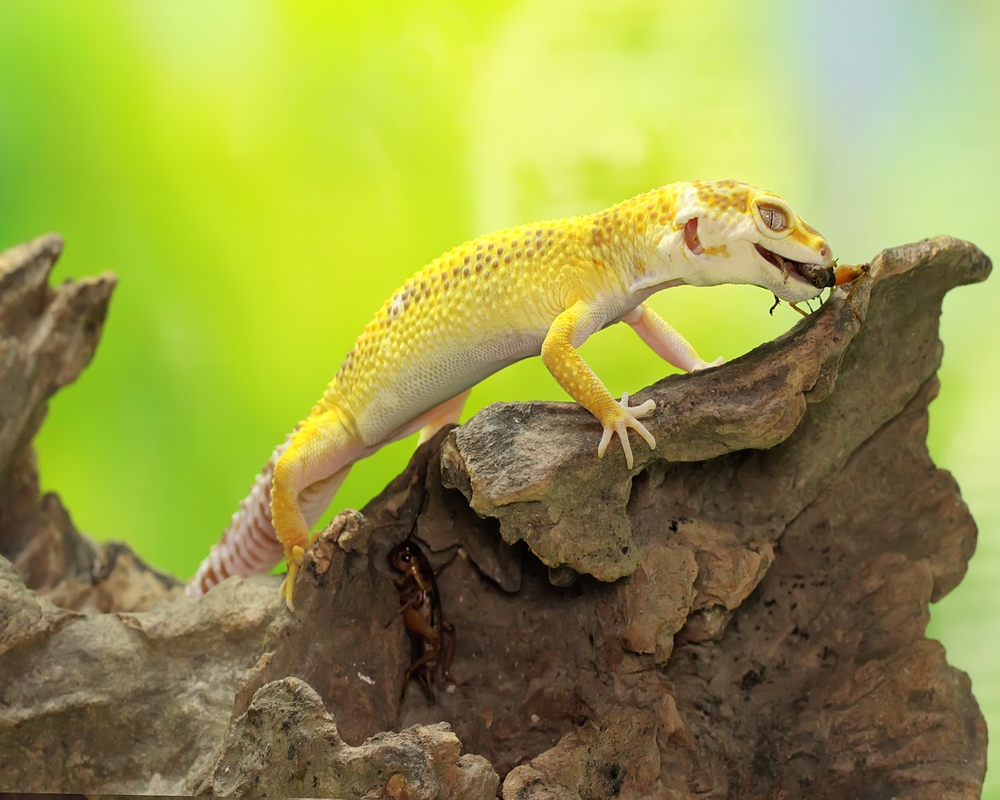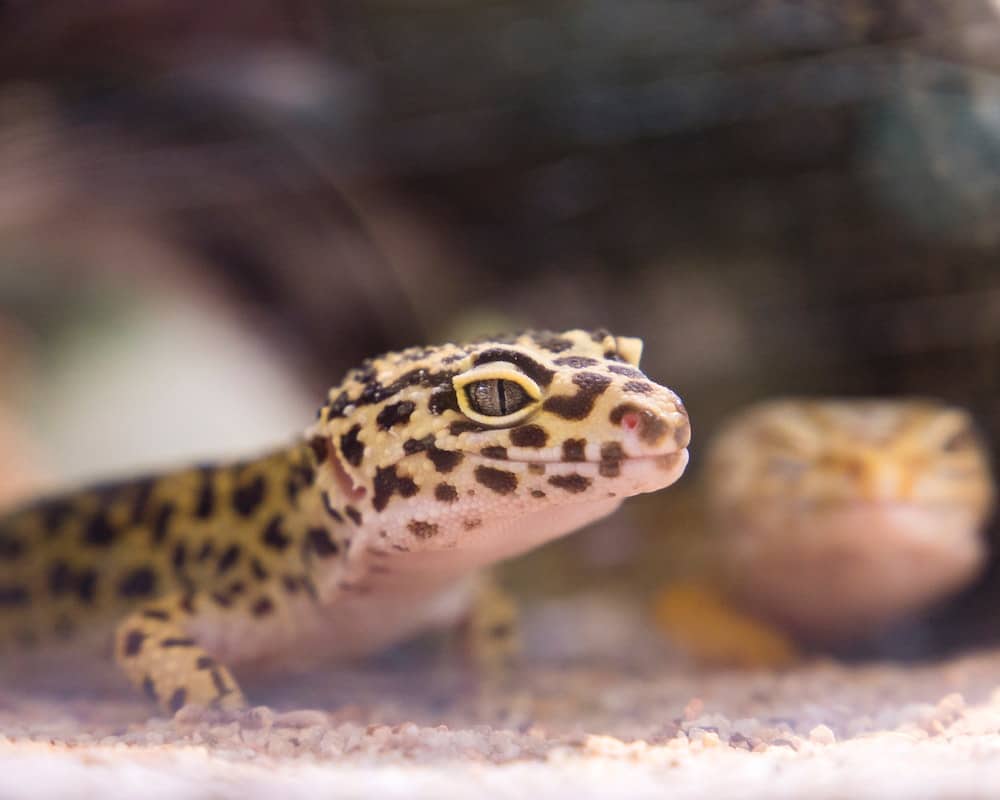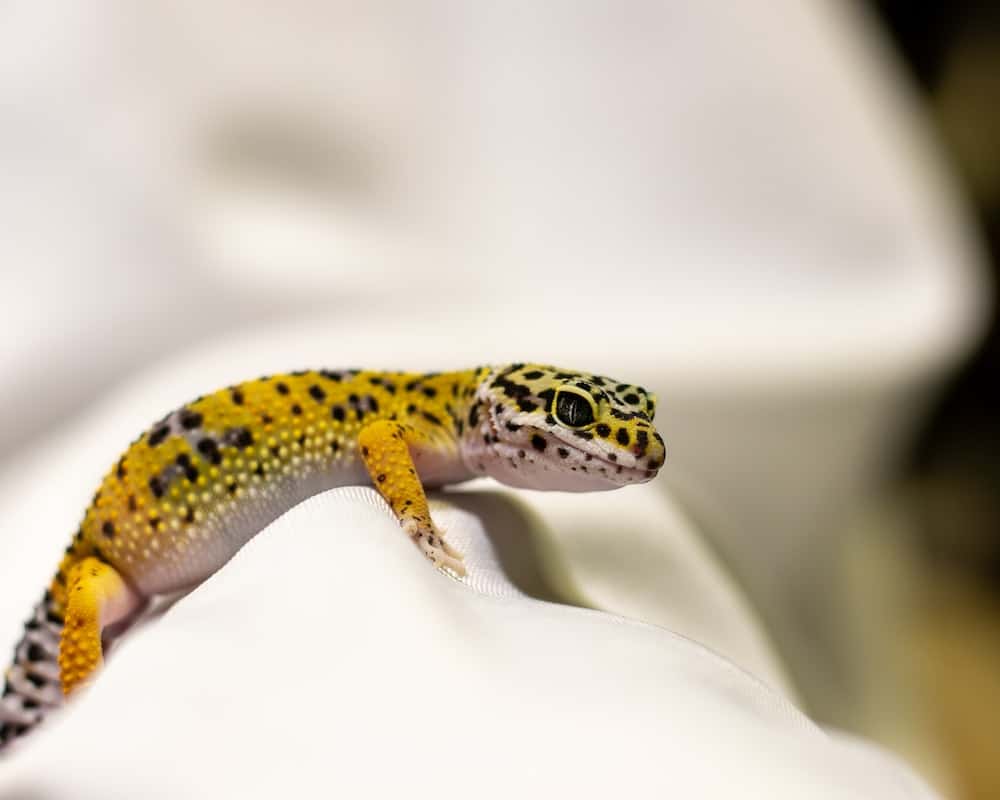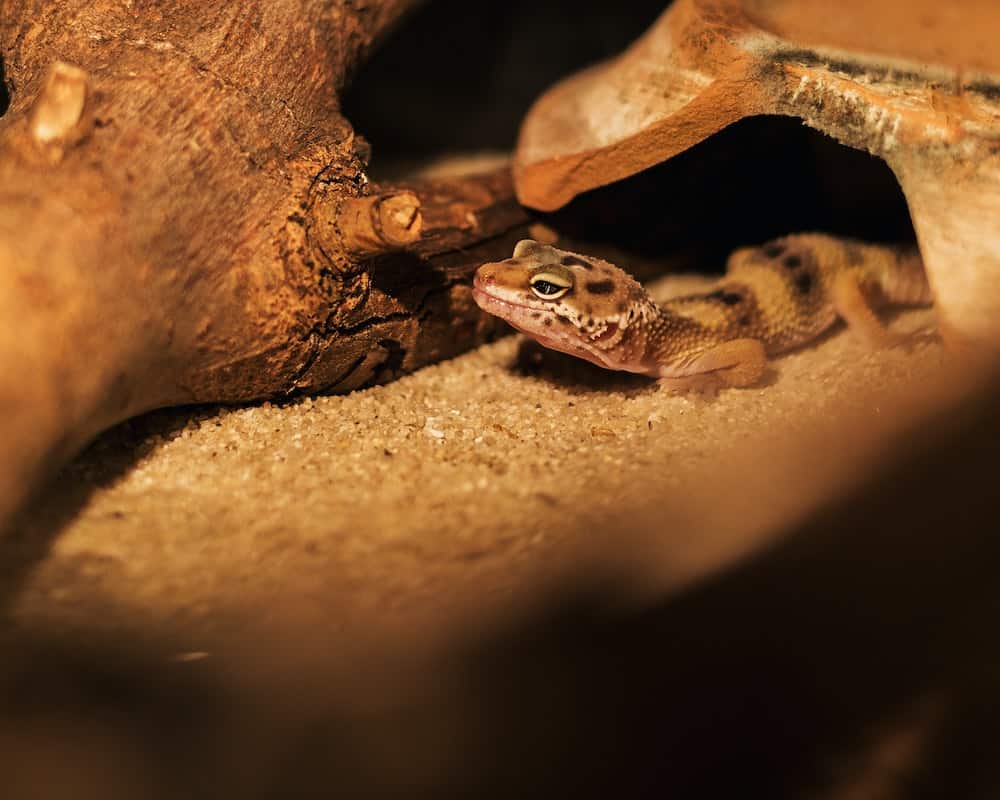Are you wondering what impaction is and how you can spot and detect it early by recognizing its symptoms? Keep reading to find out all about leopard gecko impaction symptoms.
Like all organisms, leopard geckos may have health issues too. One commonly seen health condition in these animals is impaction. Impaction is a health condition that occurs when some blockage or indigestible material obstructs the passage of the digestive tract. Some symptoms include swollen abdomen and loss of appetite.
What Is Impaction In Leopard Geckos?
Impaction is a health condition that occurs in leopard geckos when some blockage or indigestible material obstructs the passage of the digestive tract. This leads to the prevention of the normal passage of all food that the leopard gecko takes in.
It usually occurs when inappropriate or very strange substances are swallowed by the leopard gecko, causing problems in the normal functioning of the digestive system.
Impaction is a serious issue if not taken care of immediately. The buildup can cause the leopard gecko to slowly fall sick and lead to organ failure. Hence, it is necessary to note the symptoms and see the early signs to take immediate action.
Top 9 Symptoms Of Impaction In Leopard Geckos
There are many signs that you can detect early on if you know what to look for. Pay attention to their food behavior and keep an eye on their fecal matter as well. Impaction can be life-threatening if not treated on time and accurately.
Here is a list of symptoms that you can watch out for:
- Unusual Constipation
If you have been paying attention to your leopard gecko, the first sign that might stand out to you is unusual constipation. This could happen due to the blocked tract in its digestive system that is not allowing the food to move out and get digested.
You might also notice that they are unable to pass out stools. This constant strain or repeated attempt to defecate without being able to pass out stools is a major sign of impaction as well.
- Swollen Abdomen
The normal abdomen of your leopard gecko will have a flat and smooth surface that is uniform in color. However, if the belly seems swollen and way too firm rather than being smooth, this is a sign of impaction.
- Loss Of Appetite
A major sign of impaction in leopard geckos is the loss of appetite. They suddenly lose interest in eating or feel uncomfortable swallowing or ingesting any food. Their decreased appetite is generally indicative of impaction. A loss of appetite is also a symptom of dehydration and this is something to also keep in mind.
As impaction has to do with the digestive tract, it generally relates to the food and stool activity of geckos, and you should be careful to see what they are ingesting.
Some substances that you should keep away from your leopard gecko and make sure they do not swallow are the following:
- Sand, gravel, or wooden pieces.
- Calcium or vitamin supplements.
- Plant matter such as stems or leaves.
- Bits of plastic, cloth, rubber, and other such materials.
- Insects with tough or large exoskeletons. For example, mealworms.
- Tiredness And Extreme Lethargy
Sometimes because of excessive efforts into constipation or lack of bowel movement, impaction can cause extreme lethargy and tiredness. The leopard gecko may seem very weak and sluggish due to a lack of energy and movement.
You will also notice that they are not active in terms of hunting for prey or playing around. Their usual energy is missing, and if you notice it lying around without any activity, this is generally a sign of impaction as well.
- Rapid Weight Loss
Due to lack of appetite and activity during hunting, you will also notice your leopard gecko will be losing weight rapidly. A healthy gecko should have a well-proportioned body with a smooth and sleek appearance.
However, if your leopard gecko looks frail and extremely thin, you should get it checked, as it could be a symptom of impaction.
- Bloated Underside Or Belly
A healthy leopard gecko has a sleek build that is smooth and flat on both sides. If you notice that your leopard gecko has a bloated underside or belly, it is a major sign of impaction.
The underside will appear to be bloated and firm instead of smooth and soft.
- Sudden Appearance Of A Spot On The Belly
The appearance of a spot on the belly of a leopard gecko is another strange yet possible symptom of impaction. It is not known why the spot appears, but in many cases, it has been noticed.
However, not all spots may be an indication, so be careful when you come to conclusions.
- Absence Or Decreased Fecal Output
Another major sign of impaction is a complete absence of fecal output. This is quite dangerous for your leopard gecko as it can collect in its body and lead to toxicity.
The passing of fecal matter is essential to ensure the proper flow of matter. A healthy leopard gecko will generally pass stools once every one or two days.
If you notice your leopard gecko is not defecating at a normal frequency, then it is a sign of impaction. It shows signs of irregular bowel movement. Also, track the frequency of your leopard gecko’s defecation as well. An irregular frequency and decreased fecal output is also a sign of impaction.
- Uneasiness
If your leopard gecko seems constantly uneasy and in a state of discomfort, then it is a sign of impaction. It may seem restless or make distressed movements or sounds by rubbing its belly against the ground.
If you notice the leopard gecko showing these signs of distress, then it is one of the symptoms of impaction. Take a look at this video for visual cues related to impaction as well as ways to approach your gecko’s treatment.
What Causes Impaction in Leopard Geckos? Top 5 Reasons
Many leopard geckos are prone to impaction mainly due to ingestion of an inappropriate substance. But there are other reasons that can lead to impaction as well.
Here are some common causes of impaction in leopard geckos that you should be aware of:
- Ingestion Of Inappropriate Substrates
One of the major reasons for impactions in leopard geckos is that they may accidentally ingest loose substrates present in their enclosure, such as sand, gravel, coconut fiber, wood chips, or walnut shells.
These materials can accumulate in the digestive tract, leading to blockages and impaction.
- Consumption Of Indigestible Objects
If you know your leopard gecko pet, you must be aware of them to be curious reptiles that may ingest objects that are not intended for consumption. This includes items such as bits of plastic, cloth, rubber, or other materials found in their enclosure. These objects are indigestible and can cause obstructions.
As their caretaker, you must try your best to ensure they do not ingest it and that you provide their food on time. Accumulation of these objects can be harmful to them and cause impaction.
- Lack Of Proper Diet And Variety In Diet
A diet lacking variety and proper nutritional balance can contribute to impaction. Feeding leopard geckos a monotonous diet, such as relying solely on mealworms without offering other prey items or appropriate supplementation, can lead to digestive issues and impaction.
It is essential for them to have a complete and balanced diet to ensure a proper digestive process and healthy upbringing.
- Feeding On Prey That Is Too Large
Sometimes leopard geckos get excited and may feed on prey that is too large for them. They should be provided with appropriately sized prey items.
Feeding them prey that is too large in relation to their body size can increase the risk of impaction. Large prey items can be difficult to digest and may cause blockages in the digestive tract.
This also includes feeding them insects that have large exoskeletons or bodies that seem very huge. You have to be especially careful if your pet gecko is still small and in its growing stages.
- Dehydration
It is not a commonly seen occurrence, but dehydration is also one of the symptoms that can be observed.
Inadequate hydration can contribute to impaction in leopard geckos. Insufficient water intake can lead to dry and compacted feces, making it harder for the gecko to pass waste through the digestive system.
Top 3 Ways To Prevent Impaction in Leopard Geckos
If you are aware of the causes and symptoms, you must also keep in mind how you can prevent this by following certain precautions.
Preventing impaction in leopard geckos involves taking certain precautions:
- Use Proper Substrate
Choose substrates that are safe and digestible, such as reptile carpet, paper towels, or tile, instead of loose substrates like sand or gravel in the enclosure of your leopard gecko. This will prevent it from ingesting any dangerous substances.
- Offer A Good And Balanced Diet
Provide a diverse diet that includes appropriate feeder insects, such as crickets, dubia roaches, and mealworms, along with occasional treats like waxworms or phoenix worms. Also, avoid giving too many insects with large exoskeletons.
- Maintain Proper Hydration
Ensure that your gecko has access to clean, fresh water at all times. Ensure that you constantly change the water and provide it in a proper dish for it to drink from the bowl comfortably.
Conclusion
Impaction in leopard geckos is a major health condition, and you can get it treated if you know what symptoms to look for.
Ensure that you are aware of leopard gecko impaction symptoms and get them treated at the vet immediately upon spotting them.




